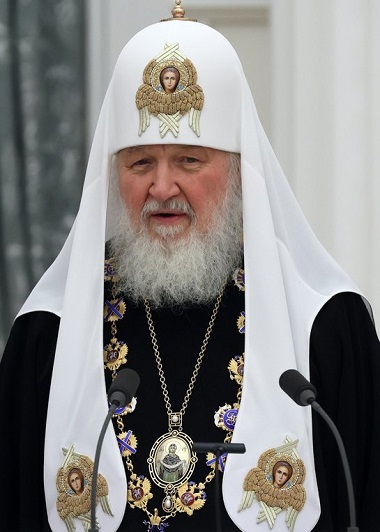
Patriarch Kirill continues to support President Putin.
In Ukraine today . . . not to condemn the perpetrators and distinguish them from victims is to do the dark work of covering the situation with moral darkness in which ‘all cats are gray.’ (Miroslav Volf, February 27 tweet)
The Russian invasion of Ukraine is testing the ultimate loyalty of believers on both sides of the divide.
Russian Christians are in a particularly difficult spot. Patriarch Kirill of Moscow has offered virtually unqualified support for President Vladimir Putin’s adventure, which has caused soul-searching and division among the faithful.
Religious scholars and writers have posted some insightful comments about the particular challenge this war presents for the Orthodox Church, and for other Christians.
‘Patriarch Kirill is done’
Orthodox theologian/philosopher Paul Gavrilyuk had strong words for Patriarch Kirill during a valuable ‘Religious Dimensions of the War Against Ukraine’ webinar hosted by St. Mark’s College March 17.
The founding president of the International Orthodox Theological Association described how immediate members of his family – including his 98 year old grandmother – have had to flee to invasion, then made suggestions on the international level (strongly backing a ‘no fly zone’ over Ukraine) and domestically (supporting and educating displaced Ukrainians, etc).
Asked by the moderator whether “the needle is going to be moved at all for Patriarch Kirill in terms of people – that is, priests and others within his own church – opposing him, Gavrilyuk said:
I think Patriarch Kirill is done politically, morally and spiritually – meaning that his whole reign will be permanently coloured and besmirched by the fact that he sees this as a metaphysical war – as the war of the forces of light against the forces of darkness.
On Forgiveness Sunday, he [Patriarch Kirill] told his listeners at the Christ the Saviour Cathedral that the Ukrainians have a lot to ask forgiveness for, for Russians. That was the implied message of his statements, and he has continued saying that this war is waged because there are gay parades in Ukraine.
He has a very small number of useful idiots in the United States and Canada who seem to be interested in supporting that particular position. Certainly a few priests of the Russian Orthodox Church outside of Russia, including an Archbishop in Canada, have publicly voiced support for the Russian war. . . .
For all practical purposes, Patriarch Kirill’s voice was the only voice that matters in this conversation. We can all have very polite and interesting negotiations. We can also make appearances that somehow diplomacy will work. Presently, no. Presently what’s going to work are anti-missile systems and stingers, and America is sending them and that’s important.
But beyond that, Patriarch Kirill is done. I am the President of the largest and the most influential theological society in the Orthodox world. It counts more than a thousand scholars, including people on this panel, and I will make everything in my power that effectively leaders like him will think twice before they support this war ideologically and subsequently morally and otherwise.
Go here to listen to the Religious Dimensions of the War Against Ukraine webinar.
Canadian leaders join condemnation
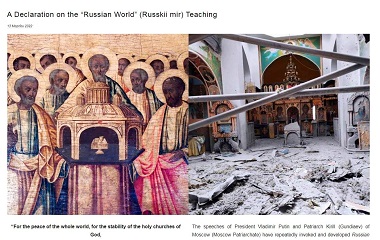 Gavrilyuk is not alone in his views. A March 24 article by Michael Swan in The Catholic Register pointed out:
Gavrilyuk is not alone in his views. A March 24 article by Michael Swan in The Catholic Register pointed out:
The Orthodox world, including nearly 40 Canadian Orthodox scholars and clergy, has risen up to condemn the Russian Orthodox Church for giving moral and spiritual support to Russia’s invasion of Ukraine.
The Volos Academy in Greece, one of the world’s most influential centres of Orthodox theology, has issued a declaration calling the “Russian World” or “Russkii Mir” teaching of Russian Orthodox Patriarch Kirill a “heresy.” Over 500 clergy, theologians and scholars have signed the declaration so far.
“We reject the ‘Russian World’ heresy and the shameful actions of the Government of Russia in unleashing war against Ukraine which flows from this vile and indefensible teaching with the connivance of the Russian Orthodox Church, as profoundly un-Orthodox, un-Christian and against humanity, which is called to be justified . . . illumined . . . and washed in the Name of our Lord Jesus Christ,” reads the March 13 statement. . . .
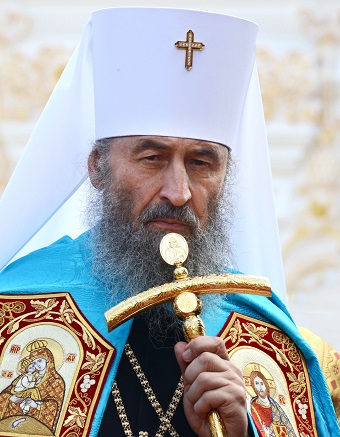
Patriarch Onufry in Kyiv has condemned the war.
Churches of the Moscow Patriarchate outside of Russia are beginning to jump ship, beginning with the Moscow Patriarchate Church in Ukraine. Patriarch Onufry in Kyiv has condemned the war as “a repetition of the sin of Cain, who killed his own brother out of envy.”
The Russian Orthodox Church in Amsterdam has announced it has split off from Moscow. The Russian Orthodox Church in Lithuania is seeking independence and the Russian Orthodox Patriarch in Georgia has condemned the war.
Canadian Russian Orthodox Archpriest Sergei Rassazovsky doesn’t want to talk about it. A call from The Catholic Register was most unwelcome and Rasskazovsky refused to answer any questions.
“We pray, much pray, on our knees,” he said. “In a political sense, I’m not ready to tell you things, OK?”
Among the signers are several local men – not all of whom are Orthodox: Brad Jersak, (St. Stephen’s University), Andrew Klager (St. Stephen’s and Trinity Western University); Rev. Matthew Francis (Holy Apostles Orthodox Church, Chilliwack); Fr. Mark Gazin (St. Francis de Sales Parish, Burnaby); Jeffrey Greenman (Regent College); and David Robinson (Regent College).
Will the WCC act?
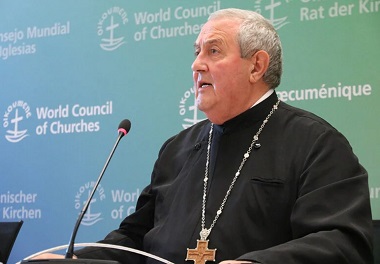
Ioan Sauca is General Secretary of the World Council of Churches. Photo by Ivars Kupcis/WCC
A March 28 comment on the Religious News site by Rob Schenk (president of the Dietrich Bonhoeffer Institute) was titled ‘World Council of Churches must act with courage and expel Kirill, Russian Orthodox Church.’
Here is an excerpt:
A growing number of global Christian leaders, including Pope Francis, Orthodox Patriarch Bartholomew of Constantinople and General Secretary Ioan Sauca of the World Council of Churches [WCC], have appealed to the leader of the Russian Orthodox Church [ROC], Patriarch Kirill, to use his office to persuade Vladimir Putin to end his war against the Ukrainian people. . . .
in a March 10 letter responding to the WCC’s Sauca, the Russian Prelate seemed to scold him, writing, “As you know, this conflict did not start today. It is my firm belief that its initiators are not the peoples of Russia and Ukraine, who came from one Kievan baptismal font, are united by common faith, common saints and prayers, and share common historical fate. The origins of the confrontation lie in the relationships between the West and Russia.” . . .
There are those who might see expulsion of the ROC as inconsistent with another dimension of WCC’s purpose, which is to mediate differences between religious groups.
But Kirill’s use of his religious imprimatur to justify the unprovoked brutal military assault on non-combatants – displacing tens of millions, violently separating families, starving whole cities, grievously wounding small children and killing pregnant women, the disabled and the elderly – are not fine points to ponder, negotiate or find compromise on.
Such a scale of terror and irreversible injury constitute Bonhoeffer’s “third possibility” of intervention: to “not just bind up the wounds of the victims beneath the wheel, but to seize the wheel itself.”
The extreme consequences of the ROC’s actions or inaction require suspension of WCC norms. Proper procedure does not trump controversial action when the latter is in the interest of preserving human life and flourishing.
Sauca is in a particularly awkward position because he himself is an Orthodox priest (from Romania).
Ecumenical Patriarch Bartholomew, based in Istanbul, is considered ‘first among equals’ among Orthodox patriarchs. He denounced Russia’s invasion of Ukraine as an “atrocious” act during a visit to Warsaw, Poland March 29.
However, roughly 100 million of the 260 million Orthodox Christians in the world live in Russia, according to a 2017 Pew Research Center report, giving Patriarch Kirill a very substantial power base.
Hard choices
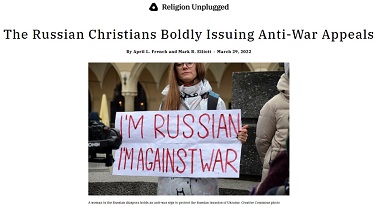 A valuable March 29 comment by American academics April French and Mark Elliott on Religion Unplugged is titled ‘The Russian Christians Boldly Issuing Anti-War Appeals.’
A valuable March 29 comment by American academics April French and Mark Elliott on Religion Unplugged is titled ‘The Russian Christians Boldly Issuing Anti-War Appeals.’
(French completed an MA at Regent College with the apropos thesis: ‘Spiritual Dissident: The Writings of Father Aleksandr Men as Dissent from Soviet Ideology.’)
Here are some highlights from their analysis:
Within the first few days of the full-scale war that Russian President Vladimir Putin launched in Ukraine on February 24, Patriarch Kirill tepidly called for peace while calling the Ukrainians defending their territory – some who attend churches of the Moscow Patriarchate that Kirill leads – “evil forces.”
Seeing the devastation wrought by Putin’s forces in Ukraine, however, Orthodox priests connected with the Moscow Patriarchate and calling themselves “Russian Priests for Peace” wrote a statement against the war in the last days of February. The priests addressed “everyone on whom the cessation of the fratricidal war in Ukraine depends, with a call for reconciliation and an immediate ceasefire.” . . .
Orthodox priests were not the only believers in Russia to sign an anti-war statement. Around the same time the Russian Orthodox statement was distributed for signatures, several of Ukraine’s evangelical theological educators expressed deep disappointment to Russian evangelical leaders over their failure to speak out against Russia’s unprovoked attack. . . .
Many Russian evangelicals responded negatively to this criticism, but not all. Nine evangelical educators and pastors took the matter to heart. They immediately drafted an anti-war ‘Appeal to Compatriots,’ strongly opposing Putin’s invasion of Ukraine and requested fellow evangelicals to endorse it.
By March 2, we received a copy that had gathered 81 signatures in its first day, a count that would reportedly reach up to 500 – mostly of the Russian Evangelical Christians-Baptists, with some Pentecostals and other Protestants. . . .
Russian Academy of Sciences religious studies scholar Roman Lunkin divides the reactions of Russia’s religious leaders to Putin’s war into three categories:
1) those who condemn the Russian invasion of Ukraine, relatively few in number, including the evangelical and Orthodox priests signing petitions;
2) a more numerous group that calls for peace but avoids assigning responsibility for the conflict, including several evangelical leaders and all Russian Orthodox bishops and metropolitans in Russia; and
3) those who feel obliged to support the war directly.
Thus, while the evangelical ‘Appeal to Compatriots’ and the Orthodox priests’ petition are admirably principled and courageous, they unfortunately do not appear to be representative of Russia’s Protestant and Orthodox Christians in total.
Most Protestant and Orthodox leaders are keeping their heads low and have so far remained silent on the Russian war against Ukraine. To their credit, unlike Patriarch Kirill, no evangelical leaders have issued ringing, enthusiastic endorsements for Putin’s unprovoked aggression.
Go here to read the full comment.
Letter of apology
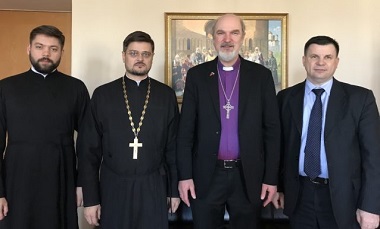
Dr. Vitaly Vlasenko (right) beside Bishop Dr. Thomas Schirrmacher, head of the World Evangelical Alliance.
The General Secretary of the Russian Evangelical Alliance, Rev. Dr. Vitaly Vlasenko, asked the World Evangelical Alliance to publish a letter to the Ukrainian people, seeking forgiveness for Russia’s actions:
As the General Secretary of the Russian Evangelical Alliance, I mourn what my country has done in its recent military invasion of another sovereign country, Ukraine. . . .
For me, as for many other Christians, the military invasion was a shock. In the worst-case scenario, I could not imagine what is now being observed in Ukraine.
Two peoples closely related to each other, many of whom are deeply devoted to the Christian (primarily Orthodox) faith, are now in a fierce battle – one side pursuing the goal of demilitarizing Ukraine, the other seeking to save their country from occupation. . . .
Today, as a citizen and as General Secretary of the Russian Evangelical Alliance, I apologize to all those who have suffered, lost loved ones and relatives, or lost their place of residence as a result of this military conflict. My prayer is that you will find strength from the Lord to extend your hand of solidarity and forgiveness, so we can live as the people of God to our world.
May our heavenly Father help us all.
Go here for the full statement.
Ukrainian ecumenical statement
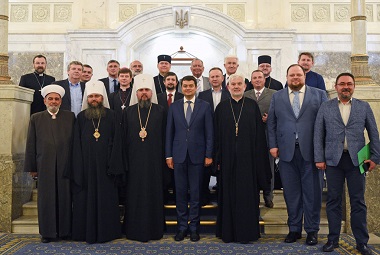
Members of UCCRO met with the Chairman of Parliament of Ukraine, Dmytro Razumkov. Kyiv, July 2020.
The Ukrainian Council of Churches and Religious Organizations (UCCRO) is a unique body which links the main Orthodox bodies with Greek and Roman Catholic, Protestant, evangelical, Jewish and Muslim communities.
The UCCRO released a statement condemning the Russian attack March 8 which included this passage:
Russia’s military attack on Ukraine is accompanied not only by shelling and bombing of peaceful infrastructure and residential buildings but also of churches.
As an example, in the village of V’yazivka, in Zhytomyr Oblast, the Russian invaders destroyed the Church of the Nativity of the Most Holy Theotokos, built in 1862. As a result of Russia’s shelling of the center of Kharkiv on March 2, the Holy Dormition Cathedral of the Ukrainian Orthodox Church was damaged.
On March 7, Russian shells hit the prayer house of the “New Life” Evangelical Church in the city of Izyum, Kharkiv region – the church building was completely destroyed. After the shelling, an Orthodox Church caught fire in the village of Zavorychi, Brovars’kyi district, Kyiv Oblast.
Go here for the full statement.
Local churches
Local Russian Orthodox churches seem to be keeping a fairly low profile. Holy Trinity Russian Orthodox Church in the Strathcona neighbourhood, for example, does not focus on the issue, but does have a ‘Links’ page with one link to the Russian Orthodox Church – Moscow Patriarchate.
On March 24, 2022, the members of the Holy Synod of the Russian Orthodox Church heard a report by His Holiness Patriarch Kirill of Moscow and All Russia on his online talks with Pope Francis and Archbishop of Canterbury Justin Welby, held on March 16. Taking part in the conversations on behalf of the Russian Orthodox Church was also Metropolitan Hilarion of Volokolamsk, chairman of the Department for External Church Relations.
The topic under discussion was the situation in Ukraine. His Holiness Patriarch Kirill spoke in detail about the position of the Russian Orthodox Church concerning the current developments that go back to 2014.
The Holy Synod resolved that “it is important to bring the Russian Orthodox Church’s stance on the current crisis in Ukraine to the notice of the heads of non-Orthodox Churches and inter-Christian organizations, as well as to develop joint peace-making and humanitarian initiatives.”
There are several Russian Orthodox churches in Metro Vancouver, along with Catholic, Baptist and Pentecostal Ukrainian churches.
